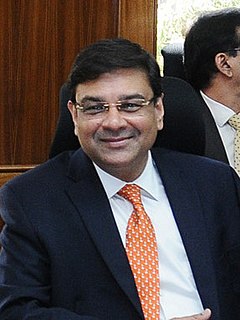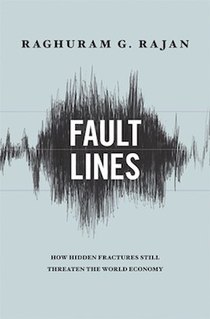Related Research Articles

The Reserve Bank of India (RBI) is India's central bank, which controls the issue and supply of the Indian rupee. RBI is the regulator of entire Banking in India. RBI plays an important part in the Development Strategy of the Government of India.

Montek Singh Ahluwalia is an Indian economist and civil servant who was the Deputy Chairman of the Planning Commission of India, a position which carries the rank of a Cabinet Minister. He tendered his resignation for this post in May 2014 following the impending end of the UPAII regime at the center. He was previously the first Director of the Independent Evaluation Office at the International Monetary Fund.
Industrial Development Bank of India was established in 1964 by an Act to provide credit and other financial facilities for the development of the fledgling Indian industry. Many institutes of national importance finds their roots in IDBI like SIDBI, Exim bank, NSE and NSDL.

Raghuram Govind Rajan is an Indian economist and the Katherine Dusak Miller Distinguished Service Professor of Finance at the University of Chicago Booth School of Business. Between 2003 and 2006 he was Chief Economist and Director of Research at the International Monetary Fund. From September 2013 through September 2016 he was the 23rd Governor of the Reserve Bank of India ; in 2015, during his tenure at the Indian Reserve Bank he became the Vice-Chairman of the Bank for International Settlements.
Sir Roderick Sheldon Deane is a New Zealand economist, public sector reformer, and businessman. He served as deputy governor of the Reserve Bank of New Zealand, and as CEO and chairman of the country's largest telecommunications company, Telecom New Zealand.
Vijay Mahajan, born October 1954, is the Chief Exexutive Officer (CEO) of the Rajiv Gandhi Foundation and the Director of the Rajiv Gandhi Institute of Contemporary Studies.
The Administrative Ref Commission ARC is the committee appointed by the Government of India for giving recommendations for reviewing the public administration system of India. The first ARC was established on 5 January 1966. The Administrative Reforms Commission was initially chaired by Morarji Desai, and later on K. Hanumanthaiah became its chairman when Desai became the Deputy Prime Minister of India.

ING Vysya Bank was a privately owned Indian multinational bank based in Bangalore, with retail, wholesale, and private banking platforms formed from the 2002 purchase of an equity stake in Vysya Bank by the Dutch ING Group. This merger marked the first between an Indian bank and a foreign bank. Prior to this transaction, Vysya Bank had a seven-year-old strategic alliance and shareholding arrangement with erstwhile Belgian bank Banque Bruxelles Lambert, which was also acquired by ING Group in 1998.
The Committee on Capital Markets Regulation is an independent and nonpartisan 501(c)(3) research organization financed by contributions from individuals, foundations, and corporations.
Wall Street Reform or Financial Reform refers to reform of the financial industry and the regulation of the financial industry in the United States. Wall Street is the home of the country's two largest stock exchanges, and "Wall Street" is a metonym for the American financial sector. Major Wall Street reform bills include the Federal Reserve Act of 1913, the Glass-Steagall Act of 1933, the Truth in Lending Act of 1968, the Community Reinvestment Act of 1977, the Gramm–Leach–Bliley Act of 1999, and the Sarbanes-Oxley Act of 2002. The most recent Wall Street reform bill, the Dodd–Frank Wall Street Reform and Consumer Protection Act, was signed by President of the United States Barack Obama on July 22, 2010, following a global financial crisis.
Yaga Venugopal Reddy, better known as Y. V. Reddy, is an Indian economist and a retired Indian Administrative Service (IAS) officer of the 1964 batch belonging to Andhra Pradesh cadre. Reddy served as governor of the Reserve Bank of India (RBI) from 6 September 2003 until 5 September 2008.

Shri Shyam Srinivasan took charge as the Managing Director & Chief Executive Officer of The Federal Bank Ltd, a major private commercial bank in India. He took over as the CEO of the bank on 23 September 2010. He joined Federal Bank, equipped with the experience of over 20 years with leading multinational banks in India, Middle East and South East Asia, where he gained significant expertise in retail lending, wealth management and SME banking.
Anil Khandelwal is an author, speaker, corporate advisor and a board member. Currently he is on the board of GAIL Gas Authority of India Ltd and serves as senior advisor at KPMG, a Maharatna company in the public sector. He is also advisor to Corporates and also a board member of Centre for Micro Finance, a company promoted by Sir Ratan Tata Trust. He is also on the governing board of National Institute Securities Market (SEBI).

Urjit Patel is an Indian economist, who served as the 24th Governor of the Reserve Bank of India (RBI) from 4 September 2016 to 10 December 2018. Previously, as an RBI deputy governor, he looked after monetary policy, economic policy research, statistics and information management, deposit insurance, communication and Right to Information. Appointed by the NDA government, Patel succeeded Raghuram Rajan as RBI governor on 4 September 2016. He resigned from his post on 10 December 2018, being the first RBI governor to state personal reasons as a driving factor for resigning. He is the fifth RBI governor to have resigned from his post before his term ended in September 2019, and had the shortest tenure since 1992.
Committee on Comprehensive Financial Services for Small Businesses and Low Income Households was an expert committee formed by Raghuram Rajan on 23 September 2013, after he was appointed as the governor of the Reserve Bank of India (RBI). It was headed by Nachiket Mor. The objective of the panel was to study various aspects of financial inclusion in India. The panel submitted its final report on 7 January 2014.
Committee on Medium-term Path on Financial Inclusion is an experts committee formed by the Reserve Bank of India (RBI) on 15 July 2015 to create a five-year plan for financial inclusion in India. It is headed by Deepak Mohanty, executive director of RBI. It is expected to submit its report within four months.
Priority Sector Lending Certificates is a tool for promoting comparative advantages among banks while they meet their priority sector lending obligations in India. "Banks with a comparative advantage in lending to the priority sector should earn priority sector lending certificates [social credits] while those falling short of the target would be required to buy priority sector lending certificates [social credits]." "A forward market for Priority Sector Lending Certificates [social credits] will help banks to focus and plan better." Total credit extended by banks in priority sector lending was INR 21,543,562.9 million towards the end of financial year 2015. The goal of Priority Sector Lending Certificates is to create market-efficiency in priority sector lending "to increase employment, create basic infrastructure and improve competitiveness of the economy, thus creating more jobs Priority Sector Lending Certificates is a method for directing credit and could be used in Asia and other parts of the world as an alternative method for directing credit.

Fault Lines: How Hidden Fractures Still Threaten the World Economy is a 2010 book by Indian economist Raghuram Rajan on the underlying causes of the 2008 financial crisis, and the structural weaknesses present in the world economy. It won the Financial Times and Goldman Sachs Business Book of the Year award in 2010.
The Banking Standards Board (BSB) is a body established in April 2015 in the United Kingdom, to promote good practice among banks and building societies. The original idea for the body came from the work of the Parliamentary Commission on Banking Standards and the subsequent Lambert Review, which called for a new type of organisation, different from traditional regulators, that would look at banking standards, culture and the root causes of poor behaviour.
References
- 1 2 3 Planning Commission, Government of India (2009). A Hundred Small Steps. SAGE Publications. ISBN 978-81-7829-950-1.
- ↑ Mark Bergen (1 October 2013). "Line of Credit: Raghuram Rajan takes charge at the RBI". Caravan Magazine. Retrieved 20 May 2018.